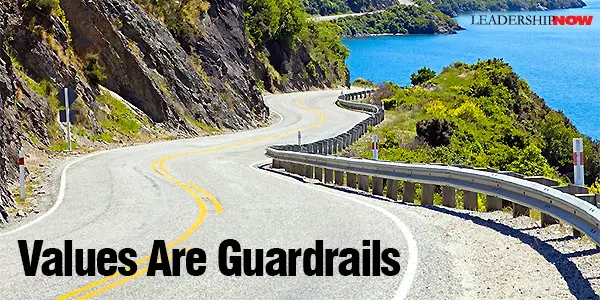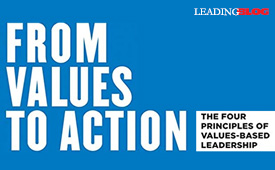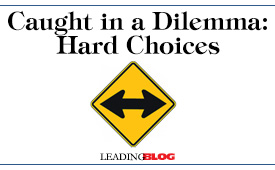Values Are Guardrails

SUSTAINABLE LEADERSHIP is based on positive values that form our character. Values are like guardrails. When we are driving, we find guardrails in areas of danger or uncertainty. They are placed there to keep us on the road and not into the ditch or off the cliff. Values are like that.
Values protect us from life’s pressures and temptations. In this way, we can avoid ethical and moral lapses in the heat of the moment. Negative outside influences are all around us. They can force us to react rather than respond and derail our leadership by compromising our judgment and common sense.
Values are the principles and beliefs by which we live our lives and make decisions. Values are about doing the right thing—a predetermined action—when we have a choice to make. Values can be difficult because they draw a line in the sand—a guardrail. But that guardrail strengthens you and helps you to make calm, rational decisions in otherwise emotional situations.
Values form your character. Your character becomes the culture of the organization—the organizational operating system. Values lived build trust.
10 Things to Remember About Values
- Values that you don’t live by might at best be aspirations, but not values. How will we conduct ourselves? What will we value and reward in our organization and, more specifically, in our individual lives? Actions reflect values. There’s no hiding there. Values guide actions and create conditions for success.
- When codifying your values, limit the list to three to seven and explain them in actionable detail. A list of 30 values will be glossed over.
- Listing cookie-cutter values like integrity and teamwork are too vague and easily dismissed. Values are action items. Be specific as to what that much-overused word means. Integrity means I will tell the truth even when it might hurt me. Honesty, yes, but what does that mean? Humility means I listen to other perspectives and will change direction when necessary. You’re looking to bring simplicity and clarity to each value.
- Our values—based on our beliefs—form the foundation of our character or organizational culture. Culture is the organization’s character.
- Hire only people that align with your values—you know, the ones you live by. You want people whose actions align with the values of the organization because these people will flourish and grow for their good and for the good of the organization. Choose your values carefully because they attract similar values and people with similar beliefs.
- When something gets derailed, there is a value misalignment or a value that was never stated. But responding to every problem by introducing a new value is disingenuous. It feels like you are doing something about the issue but it doesn’t get to the heart of the matter. In this case, you may need a strategy discussion, not a values discussion.
- As leaders, we are looking for input, not consensus when pulling together your organization’s values.
- Values override rules. Rules make us aware of the value. They lead us to it. While rules should be based on values, when the application is not clear, the default is the value, not the rule.
- Values should be based on positive beliefs because they build others up. Values based on negative beliefs tear people down.
- Values transcend goals and strategies. After goals and strategies are gone, values remain.
* * *

Follow us on
Instagram and
Twitter for additional leadership and personal development ideas.



Posted by Michael McKinney at 10:08 AM
Permalink
| Comments (0)
| This post is about Ethics









